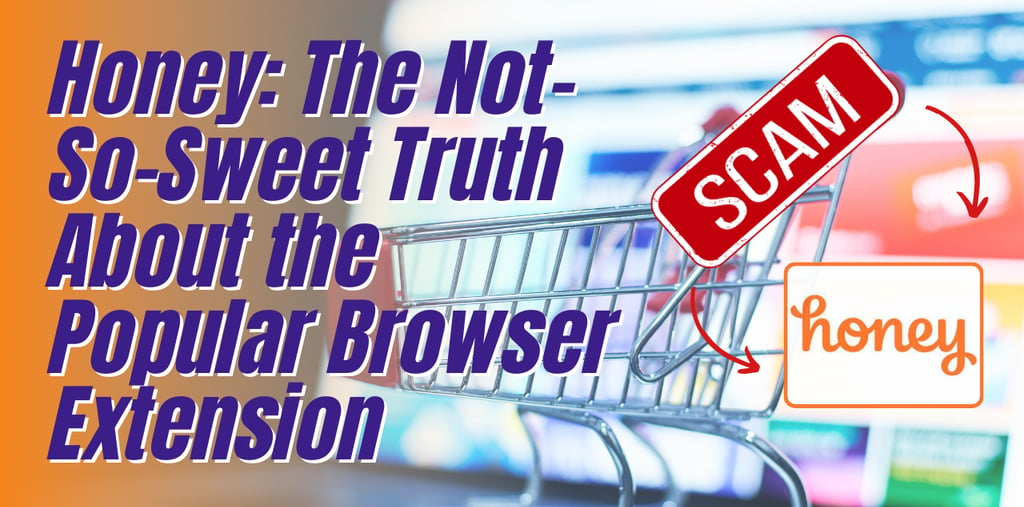Honey: The Not-So-Sweet Truth About the Popular Browser Extension
Uncover the hidden truths about the Honey browser extension, exposing its deceptive practices that harm consumers and content creators.
AFFILIATE MARKETINGINFLUENCER COLLABORATIONSSCAM ALERT
Agile Mediaz
12/23/20243 min read


If you’ve been alive on the internet for more than five minutes, you’ve probably heard of Honey—the browser extension that promises to “find the best deals online and save you money.” It sounds great, right? Free money, no effort! Unfortunately, as investigative YouTuber MegaLag, has uncovered, Honey might not be the sweet savior we thought it was. In fact, it’s starting to look a lot more like sour syrup.
1. Honey’s “Best Deal” Claim: A Sticky Situation
Honey promises to scour the internet for the best coupon codes and apply them at checkout. But according to MegaLag’s investigation, that claim might as well be filed under “fiction.” MegaLag revealed that Honey’s partner stores often dictate which coupon codes users see—even if better discounts exist.
For example, an employee from the Australian clothing store Princess Polly admitted in a Honey-produced podcast that stores could “control the discount code percentage,” ensuring that Honey shows users a lesser discount like 10% instead of a hidden 30%.
It’s like being told the salad bar is “all-you-can-eat,” only to find out they’ve locked up the croutons.
2. Affiliate Link Hijacking: Stealing from the Little Guy
Here’s where things get really sticky. Honey has a habit of hijacking affiliate links at checkout, replacing them with its own. Let’s say you click an influencer’s link to buy a product. That influencer, who spent hours crafting engaging content, expects to earn a small commission for referring you. Enter Honey. With the finesse of a digital pickpocket, Honey replaces the affiliate cookie with its own, pocketing the commission.
MegaLag demonstrated this practice in his video, and NotebookCheck.net described it as sneaky and potentially fraudulent. Content creators lose money while Honey—and its parent company PayPal—laugh all the way to the bank.
3. The Honey Gold Illusion: Cashback or Backstab?
Honey’s cashback feature, Honey Gold (now rebranded as PayPal Rewards), offers users a portion of the commission it hijacks in the form of reward points. Sounds nice until you do the math. MegaLag’s test showed that while Honey pocketed a $35 commission, the user received a measly 89 cents in cashback.
That’s the cashback equivalent of finding a penny on the sidewalk and thinking you’ve struck gold.
4. The Creator Problem: Promoting Their Own Downfall
Influencers have promoted Honey in droves, with almost 5,000 sponsored videos reaching 7.8 billion views. Even major creators like Linus Tech Tips jumped on the Honey bandwagon—until they realized what was happening. Linus Media Group eventually ended its partnership, stating, “If someone clicked on an affiliate link and then they used Honey... Honey will override that tracking link.”
Unfortunately, many influencers didn’t know Honey was poaching commissions, and those promotional videos remain online, luring new users into the Honey ecosystem.
5. Honey’s Deceptive Core: Misleading the Masses
Honey’s core promise of finding “every working coupon code on the internet” doesn’t hold up to scrutiny. Partner stores can dictate which codes Honey displays, leaving users with crumbs while businesses and Honey hoard the cake.
Even the Better Business Bureau launched an inquiry into Honey’s advertising claims, but Honey conveniently discontinued its misleading claims, prompting the BBB to drop the case.
The Verdict: Should You Uninstall Honey?
If you’re still using Honey, it might be time to reconsider. While its early days may have been marked by good intentions, the extension has morphed into a tool for corporate greed at the expense of consumers and creators alike. Between misleading discounts, hijacked affiliate links, and shady cashback schemes, Honey’s reputation is melting faster than ice cream on a hot day.
Final Thoughts
Not all that glitters is gold—and not everything labeled “free” is truly free. Sometimes, the real cost is hidden behind the scenes. Stay savvy, shop smart, and don’t let browser extensions pull a fast one on you.
Sources:
MegaLag, The Honey Trap YouTube Video Series
NotebookCheck.net, YouTuber Finds Popular Browser Extension Honey Engaging in Deceptive Affiliate Practices
Goosed.ie, No, Honey Isn’t Legit: You Should Uninstall the Honey Extension
Watch Our Video Take On This Topic



Connect
Empowering small businesses through digital marketing solutions.
Explore
Innovate
contact@agilemediaz.net
© 2024. All rights reserved.

